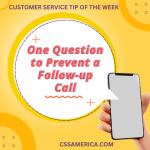This wish applies to any business, but let’s focus this wish on the healthcare providers of the world.
If I could wish one thing for any hospital that would improve its patient satisfaction, it would be this. I would wish that every person — food service worker, physician, nurse, administrator, CNA, physical therapist, unit manager, unit secretary, human resources manager, business office clerk, environmental services employee, volunteer — view themselves as a customer service representative.
Every individual noted above has their technical or clinical or financial or other professional responsibility. But, in healthcare, as with other service industries, part of that technical or clinical or financial or other professional responsibility involves communicating with others. It involves face-to-face communications, it involves telephone conferences, it involves e-mails being sent. Part of that responsibility includes communications with co-workers or communications with vendors or patients or family members or physicians or other guests.
That communication conveys something. It conveys that you care about the individual as a person, or you don’t. It conveys that you are focused on the person more than the task, or you’re not. It conveys that you’re responsive and “other focused,” or it conveys that you’re slow to respond and “me focused.” It conveys that you understand the “care” part of healthcare as opposed to the technical or clinical or financial aspect of the task being the only thing of importance.
Imagine a hospital where every person you walked by, every person you spoke with on the phone, every person you communicated with via an e-mail treated you like you were special. Whether you are a co-worker or the visitor or the patient, you felt special. You felt like these people wanted to help you, and caring for your health or your other needs were simply the methods that they used to care for you as a person.
Imagine having this culture where all hospital personnel truly understood how they themselves were customer service representatives. If you can imagine this, it is easy to imagine patient satisfaction scores going through the roof.
Interested in improving your company’s customer service? See more information at: http://www.cssamerica.com/





















